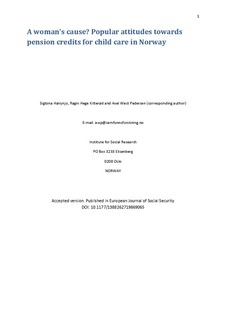A woman’s cause? Popular attitudes towards pension credits for childcare in Norway
Peer reviewed, Journal article
Accepted version
Permanent lenke
http://hdl.handle.net/11250/2612441Utgivelsesdato
2019Metadata
Vis full innførselSamlinger
- Publikasjoner fra CRIStin [715]
- Tidsskriftpublikasjon [388]
Sammendrag
In many countries – including Norway – concerns about the persistent gender gap in pensions have led to the introduction of child credits that compensate mothers for losing accrued pension rights while they care for small children. In political debates child credits are typically framed as being unequivocally women-friendly. But, although they help to reduce the gender gap in pension income, they tend to discourage mothers’ paid work and favour couples with a gendered division of paid and unpaid work. This article uses survey data to investigate the extent to which the working age population in Norway supports the idea that parents (mothers) of pre-school children with low earnings should be compensated by the pension system. We examine whether the pattern of support is consistently gendered or whether there are internal cleavages among men and women according to socio-economic status and work-family adaptation. We find that, although both genders express positive attitudes, women are on average more inclined to support child credits than men, but with strong internal divisions. While less-educated women in families with a traditional division of labour constitute the most supportive group, highly-educated women in gender-equal families are as sceptical towards child credits as their male peers. Surprisingly, among both genders, we find that younger cohorts are as supportive as older cohorts. A woman’s cause? Popular attitudes towards pension credits for childcare in Norway
